Mihkel Zilmer received the lifetime achievement award for research

The government of Estonia has approved the laureates of this year’s national research awards. The lifetime achievement award for long-term outstanding research and development was presented to Mihkel Zilmer, Professor of Medical Biochemistry at the University of Tartu, and linguist Asta Õim. University of Tartu researchers received annual research awards in four categories.
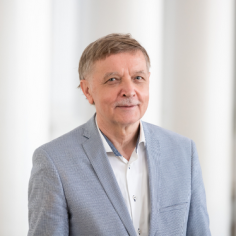
Mihkel Zilmer is a renowned medical biochemistry and neurosciences expert and nutritional specialist. He has combined clinical and fundamental science and is a forerunner in translational medicine, bringing a molecular perspective to clinical specialisations ranging from cardiology to paediatrics and psychiatry. Also, he has trained several generations of new medical scientists. Mihkel Zilmer’s excellent collaborative skills, clarity of expression and inspiring action have resulted in numerous patents, good textbooks and messages that speak to society at large.
Asta Õim is a linguist and researcher of Estonian figurative speech. She is committed to systematically analysing Estonian vocabulary and phraseology and has compiled numerous dictionaries.
Five researchers of the University of Tartu were recognised with the annual awards (20,000 euros) for best research completed and published during the previous four years.
Exact sciences
In science and technology, the award was granted to Tomi Sebastian Koivisto, Associate Professor in Theoretical Physics at the University of Tartu, and Luca Marzola, Research Fellow at the National Institute of Chemical Physics and Biophysics for the cycle of works “The meta-geometrical basis of physics”.
The recipients strive for a coherent description of gravity – one of nature’s most profound mysteries. They derive theories systematically of elementary axioms. This minimalist approach has created an excellent basis for comparing different ideas, reflecting the physical phenomena of the world, describing situations that have not been studied before, and designing the necessary observations.
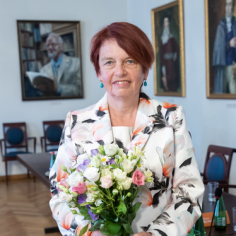
Medical sciences
The award in medical sciences was granted to Irja Lutsar, Professor of Medical Microbiology at the University of Tartu, and Tuuli Metsvaht, Professor of Paediatric Intensive Care and Pharmacotherapy at the University of Tartu, for the series of works “Interdisciplinary approach to neonatal sepsis”.
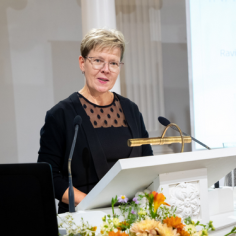
Lutsar and Metsvaht comprehensively deal with the development, prevention and treatment of neonatal sepsis.
They have worked out an optimal dosage regimen of antibacterial drugs for treating severe infectious diseases in newborns and infants. The treatment guidelines have been tested in clinical settings; and now help provide evidence-based, effective treatment, save many new lives and prevent or mitigate the consequences of infections.
Geology and biology
In the field of geology and biology, Associate Professor in Animal Ecology Tuul Sepp was awarded for her series of works, “Anthropogenic environmental change and the health of wild animals”.
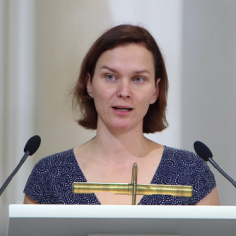
Sepp analyses how to assess the impact of civilisation and environmental change on wild animals and fish and how this knowledge can improve our quality of life. The study of cancers in animals contributes to ensuring human health. Changes in the behaviour of free-living species and new indicators of animal health and welfare enable researchers to predict the fate of populations and take action where necessary.
Humanities
In the humanities, Associate Professor of Estonian History Enn Küng received the award for the research cycle “Political, military, legal and economic relations between the central authorities of Tallinn and Stockholm from the second half of the 16th century to the early 17th century”.
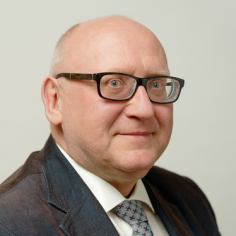
Küng observes history as an integrated system, from political situations and military affairs to legal arrangements and communication. The focus is on the divergence of interests of the Hanseatic town relying on old freedoms and the modern military state. The work gives an idea of the complex role that verbal nuances had in the dispute with the central authorities. Placing the new material into a broader context puts the then-Eastern Baltics firmly on the economic map of early modern Europe.
Minister of Education and Research Tõnis Lukas congratulated all the awardees and expressed gratitude for their contribution to Estonian science. “Their field of work is even broader than science – it is the entire society. Recipients of the lifetime achievement awards, Asta Õim and Mihkel Zilmer, have not only changed Estonian science but also affected the lives of many Estonian people. A deep bow to you.”
According to the Chair of the National Research Awards Committee, President of the Estonian Academy of Sciences, Tarmo Soomere, the level of the nominees for this year’s annual research awards was pleasantly and evenly high. “The cycles of works of nearly all fields contributed to maintaining people’s health or addressed issues of deep concern to society. Top-level work on issues that matter to the country, society and people is characteristic of a mature and confident research community.”
The awards will be presented at a ceremony during the celebrations of the anniversary of the Republic of Estonia.
Read the short introductions of the recipients of the 2023 national research awards (in Estonian).
Other recipients of this year’s awards are
- Tuuli Käämbre (chemistry and molecular biology, for the research cycle “Chemical energy production and regulation of mitochondrial energy transfer in pathologies”);
- Vitali Sõritski (engineering sciences, for the research cycle “Molecularly imprinted polymers: modern biomimetic sensing materials for medical diagnostics and environmental monitoring”);
- Veiko Uri (agricultural sciences, for the research cycle “The carbon dynamics in Estonian forest ecosystems affected by different management regimes”);
- Mall Leinsalu (leader of the research team), Rainer Reile and Aleksei Baburin (social sciences, for the research cycle “The impact of social changes and crises on health and health inequalities”).



